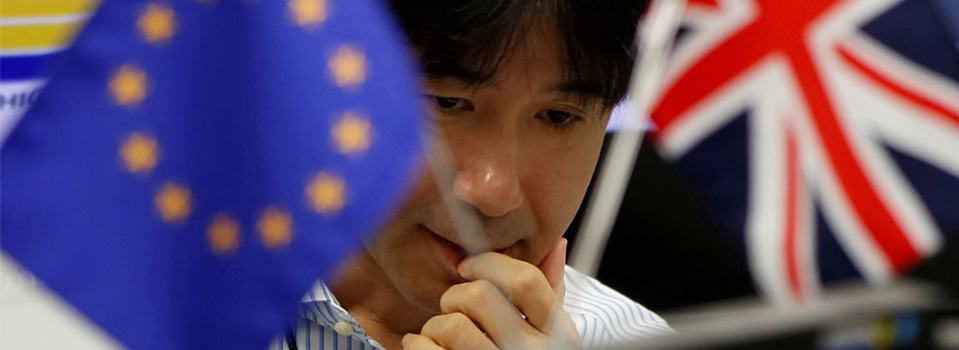BREXIT OFFERS A CAUTIONARY TALE FOR AN ASIA SEEKING GREATER INTEGRATION

The shock British vote for an exit from the European Union (EU) sends out a chilling message that Asian institutions and even countries would do well to heed.
At its heart, the British referendum result was a vote against big government, big business and big ideas.
This cautionary message must be heard by those driving regionalism in Asia, particularly the Association of Southeast Asian Nations (Asean); free-trade pacts such as the Trans-Pacific Partnership (TPP); and the economic direction of countries such as China, Indonesia and India in an age of rampant globalisation.
They have to do this if they are to avoid the uncertainty that now awaits the EU, and certainly the catastrophe that Britain probably has brought upon its future generations through a mere four- percentage-point preference for leaving the EU.
One refrain that existed in Britain, even much earlier than the referendum, was that Brussels was not only physically but also politically distant from the British heartland. The EU bureaucracy was a gigantic machine remote from the day-to-day concerns of millions in Britain, France, the Netherlands and elsewhere as it pursued the nitty-gritty agenda of European unification.
Indeed, many in Britain see Westminster itself as a law unto itself, smugly dismissive of the concerns of ordinary mortals. At least in the case of Westminster, the British people have the right to vote governments out. Not so for Brussels. Instead, Britons have no political control over an EU which exercised increasingly minute control over their economic lives.
The build-up of disenchantment over decades, and the seismic rupture that followed it on June 23 this year, must never be allowed to occur in Asean.
Admittedly, Asean is not a supra-national institution like the EU. There is no concept of pooled sovereignty behind it as there is in the European variation of regionalism. The Asean Secretariat in Jakarta is nowhere close to being a legislative centre of power along the lines of Brussels. Also, of course, monetary integration is not on Asean’s agenda (although Britain has decided to leave the EU in spite of not having been a part of the Eurozone, which came under intense pressure recently).
However, to the extent that the inauguration of the Asean Community foretells growing integration in economic and other fields, it is essential for the organisation to remain responsive to the interests of its diverse population. The stance that governments adopt at Asean fora must reflect the widest possible confluence of their citizens’ interests and address the broadest areas of national concern.
There is no running away from nationalism. The EU shows Asean which way not to go.
Big Business
Big business – the most clearly recognisable face of globalisation – also attracted the ire of those left behind by the forces of change. The referendum results revealed a deep rift between the City of London – the epitome of financial globalisation that found a natural home in Europe – and wide swathes of economically disadvantaged Britain to which London essentially was foreign territory.
Indeed, so intense is the divide that there are those who believe that London should secede from Britain and remain in the EU. The economic interests of the City are served by the same Europe that has alienated working-class and even some middle-class Britons.
Now, globalisation is nothing if it is not simultaneously integrative and divisive. Big industries and banks unite countries across the globe but they divide countries and even cities. Winners – globalised cosmopolitans – and losing heartlanders who cannot keep pace begin to inhabit different economic worlds within the same national and political space. The divergence is not sustainable.
The challenge for trans-national integration, as in the case of Asean, and certainly for trans-continental initiatives such as the 12-nation TPP, is to move ahead in a way that minimises the economic disruption and dislocation associated with liberalisation.
Big business is not bad: Forgetting that it is not everything is bad.
At the end of the day, globalisation cannot be only about winners. In democracies at least, the one-person-one-vote system will ensure that a majority which is or which sees itself excluded from the fruits of integration will vote out political parties associated with globalisation.
In fact, the majority might subvert an entire system of political economy, just as the British have done by destroying the institutional European underpinnings of contemporary Britain. Systemic change takes time to come, but when it does, it destroys old verities with a vengeance. The spark could be provided by immigration – as it did in Britain – or by something else, but the fire destroys even structurally sound houses.
Big Ideas
Then, there is the role of big ideas.
An illuminating comment on Britain’s vote came from a EU statesman who advised his peers to speak of the tangible and earthy aspects of integration by going beyond the Europe of lofty speeches. This is so that the EU can overcome the emotional distance between itself and many of its residents.
Alienation is a real danger.
Robert Ford, professor of politics at the University of Manchester, and another author have coined the term “left-behind” to describe the alienated: “older, white, socially conservative voters in more economically marginal neighbourhoods” who “turned against a political class they saw as dominated by socially liberal university graduates with values fundamentally opposed to theirs, on identity, Europe – and particularly immigration”.
It is not that Britons who opted to leave are against the defining ideas of the EU, including democracy and freedom from war. However, lofty edifices built on them that have little to do with local problems are shaky.
Asian countries that are pursuing integration must avoid the temptation to justify policies on the basis of grand ideas such as the rise of Asia, to say nothing of an historical settling of scores with a once-dominant West.
It is much better to show how integration will make life better for the worker in Anhui, the farmer in Java or the merchant in Gujarat.
Whatever happens to the EU now that Britain has decided to leave it, Asia must avoid the perils of regional overreach that ignores the little man – and woman.
Derwin Pereira heads Pereira International, a Singapore-based political consultancy. He is also a member of Harvard University’s Belfer Centre for Science and International Affairs.

